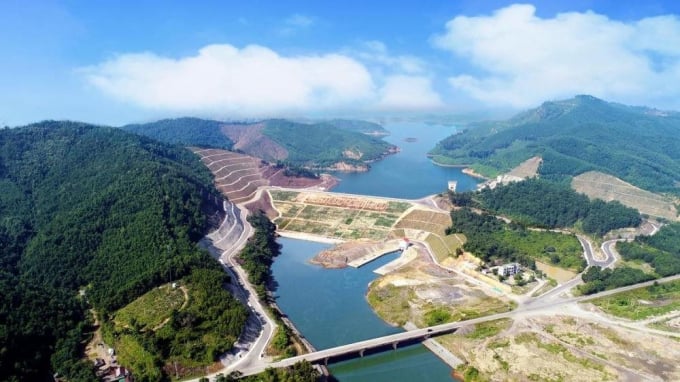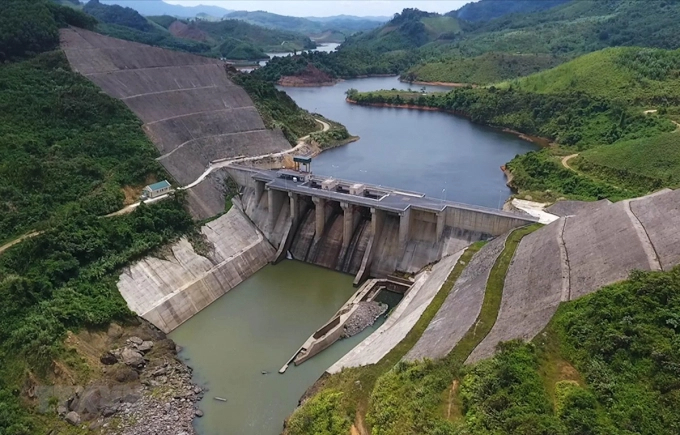June 21, 2025 | 02:11 GMT +7
June 21, 2025 | 02:11 GMT +7
Hotline: 0913.378.918
June 21, 2025 | 02:11 GMT +7
Hotline: 0913.378.918

Overview of Ngan Truoi dam area and reservoir in Ha Tinh province.
The new paper complements an article on irrigation project administration being devolved to provincial People's Committees based on management and exploitation efficiency in certain circumstances.
The unit is expected to accept responsibility for incidents affecting the safety of the work and the downstream area as a result of subjective causes attributable to the management and exploitation unit. Additionally, the unit operating the irrigation works is evaluated for failing to complete assigned tasks and allowing serious violations in the implementation of regulations governing licensing for activities within the unit to occur.
MARD explained the idea by stating that almost all interprovincial irrigation works are managed by local governments. The majority of municipalities manage and utilize these works effectively. There are still a lot of management and exploitation duties to be completed in a number of projects, and as a result, local exploitation units have not been implemented effectively, resulting in suboptimal work efficiency. There are even locations where the operation, security, and safety of the works are significantly impacted.
The present decentralization of interprovincial project management ensures that both the national and local governments maintain the status quo. However, rules for exceptional circumstances are essential to really enhance the capacity and efficiency of project management and exploitation.

Assign specific responsibilities of the ministry and localities in the management of irrigation works.
The ministry published three papers on decentralizing the administration of 23 works whose exploitation and protection are delegated by MARD to local governments. There are no laws defining the particular duties of ministries and local governments when decentralized activities are managed in this manner.
As a consequence, the ministry suggested amending an item of the Irrigation Law to include a section on irrigation works management decentralization.
To begin, MARD is responsible for compiling and organizing a list of medium-term funding sources for each period of repair, upgrade, and modernization of decentralized works. Organizing and supervising the monitoring and supervision of water sources and water quality in interprovincial projects for the purpose of direction and administration. Creating and maintaining a database on irrigation, the use, and preservation of which spans two or more provinces. Examining and approving adjustments to interprovincial dam and reservoir duties in consultation with the provinces' People's Committees. Additionally, advising and checking the irrigation law's application.
Unless otherwise specified by law, provincial People's Committees shall assume the owner's obligations for decentralized irrigation works. Directing the local irrigation work exploitation unit to manage and exploit irrigation works in compliance with the irrigation legislation and other applicable regulations.
According to the Directorate of Water Resources, Vietnam has constructed approximately 900 irrigation systems with a service area of 200 hectares or more, including 122 medium and large irrigation systems with a crop area of more than 2,000 hectares. Currently, the nation has 7,342 dams and irrigation reservoirs with a combined storage capacity of 50,000m3 or a dam height of at least 5m.
The irrigation system's total irrigation capacity is 4.28 million hectares, with annual water supply guaranteed for 7.3 million hectares of rice land and 1.72 million hectares of vegetables; over 6 billion m3 of domestic and industrial water; flood prevention and control, flood control for urban areas, residential areas, and production protection. Which prioritizes a number of large-scale irrigation projects.
Translated by Samuel Pham

(VAN) The waste of resources from agricultural by-products and the situation of counterfeit and poor quality goods in production causing losses of thousands of billions were pointed out by the National Assembly deputy.

(VAN) After 5 years of implementation, the CAI initiative has helped coffee growers change their farming practices, moving toward responsible agriculture that meets global export standards.

(VAN) The primary prerequisite for the comprehensive and robust integration of Vietnam's livestock sector into the global value chain is the establishment of a disease control system.

(VAN) The results of national programs are essential for establishing a contemporary livestock sector that is well-equipped to meet the demands of both domestic and international markets, with robust biosafety standards.

(VAN) The UNESCO Global Geopark revalidation of Non nuoc Cao Bang and the transition to a two-tier administrative model are presently undergoing a pivotal moment in Cao Bang, the northernmost province of Vietnam.
/2025/06/13/5330-2-004539_953.jpg)
(VAN) Changing policy mindset and removing investment barriers are urgent requirements to open up new development space for enterprises in the agricultural sector.

(VAN) The areas include the restoration of five million hectares of marine ecosystems.